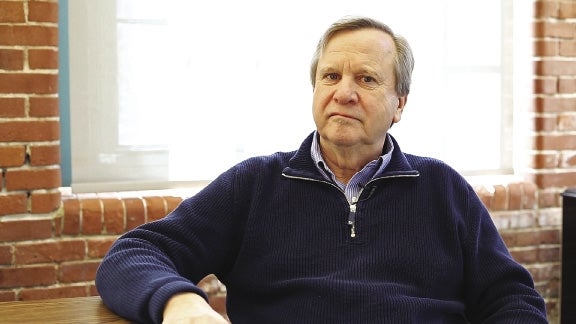
Alternatives Unlimited in Whitinsville is many things: a mill renovated into cheery, sunlit apartments, workshop space and offices; the home of four different theater groups; and the site of summer concerts where people gather to dance and eat and watch children play.
You could spend pages describing Alternatives without even touching on the organization’s mission, which is serving people with developmental and psychological disabilities. And that’s no accident. Under the leadership of Dennis Rice, who helped found the group 37 years ago and today serves as executive director, Alternatives has developed a way of supporting its clients that involves not just sending them out into their communities but drawing the communities into the organization.
“I would say that Dennis is a man of just extraordinary vision,” said Harry Whitin, former editor of the Telegram & Gazette and a member of the family that owned the mill that became Alternatives’ headquarters. “He has managed to turn treatment programs for the developmentally disabled and the mentally ill upside-down.”
Today at Alternatives, people who live in the organization’s group housing, as well as members of the general public, attend openings of the building’s art gallery together. They share art classes and sit side by side at plays. They develop volunteer projects that they can do around the local towns together.
“Without a community that’s accepting of the people we serve, they will continue to live in isolation in this sort of parallel world,” Rice said.
How War Opposition Shaped His Future
For Rice, a life working in the service of people with disabilities began almost as an accident. A theater major in college, he became a conscientious objector to the Vietnam War, which required him to spend two years doing service work. He ended up working at a psychiatric hospital.
“It turned out to be a great experience,” he said.
But Rice was troubled by some of what he saw. People came into the hospital very sick and got the help they needed, yet after they left the intensive treatment environment, their problems often returned. Without support in the community, they ended up back where they started.
As it turned out, many things about the care of people with developmental and psychological disabilities were starting to change. In the mid-1970s, the state was sued over its system of mental hospitals and ended up beginning a deinstitutionalization process that included the creation of community programs for people leaving the hospitals.
“That was a very exciting time,” Rice said. “It was almost a frontier.”
When Alternatives started, he said, there was no developed system to move people into community programs. He and his colleagues ended up going to one institution, Monson State School in Western Massachusetts, and standing on the walkways to talk to residents.
“Literally, as someone walked by we’d say ‘Hey! Do you want to come live in a group home?'” he said.
Rice said nearly everyone they talked to said yes.
From a beginning with three group residences, Alternatives has now grown to encompass 55 programs, more than 500 apartments, 700 staff members and more than 2,000 people served in any given day. Its annual budget has grown too, from $250,000 to $40 million, as it’s landed more state contracts to run programs in different communities.
Despite the change in scale, Rice said a committed, skilled staff remains at the heart of everything Alternatives does, and one of his priorities is to give workers the freedom to develop their own ideas and become leaders within the organization.
Broadening Its Focus
Alternatives’ focus has shifted over time. In the beginning, Rice said, he and others in the organization thought their key goal would be to move clients into the community, encouraging more interaction that would lead to broader lives with jobs and connections to the people around them. It turned out to be more complicated than that.
Rice said one example was a sheltered workshop at Alternatives that provided jobs for close to 200. It was a way for people who might never have earned their own paychecks to do real work, he said, but “the not-so-good thing is people got sort of stuck here.”
So, about 10 years ago, Alternatives closed the workshop and set up multiple sites in different towns where 25 to 30 people would work. The smaller size was designed to encourage interaction with the surrounding communities and, beyond that, each site set up its own project to engage with people outside its walls, from a public computer bank to community gardens.
In Uxbridge, Rice said, the local work site came up with a particularly successful community project, a gallery to display the work of amateur artists from within and outside the organization. The concept became so successful that the display of art spread elsewhere in the community — to town hall and local businesses and offices.
“There was art all over town,” Rice said.
The ultimate effect? Rice said people approached the Alternatives office with job opportunities and other ways to engage the people served there.
The most visible way Alternatives has reached out to the community is the mill building itself. The group rehabilitated the old building to incorporate geothermal, solar and hydropower electrical systems, which have helped it reach LEED gold certification. The building, with its theater, gallery and artists’ workspace, gives all sorts of people a reason to visit.
That’s Dennis in a nutshell right there,” said Robert E. Paulsen, chairman of the Alternatives board and a vice president at Middlesex Savings Bank. “He always wanted to make sure the people he served in the programs were connected to the community.”
Video
Business Leader of the Year 2013 – Dennis H. Rice, Alternatives Unlimited Inc.

